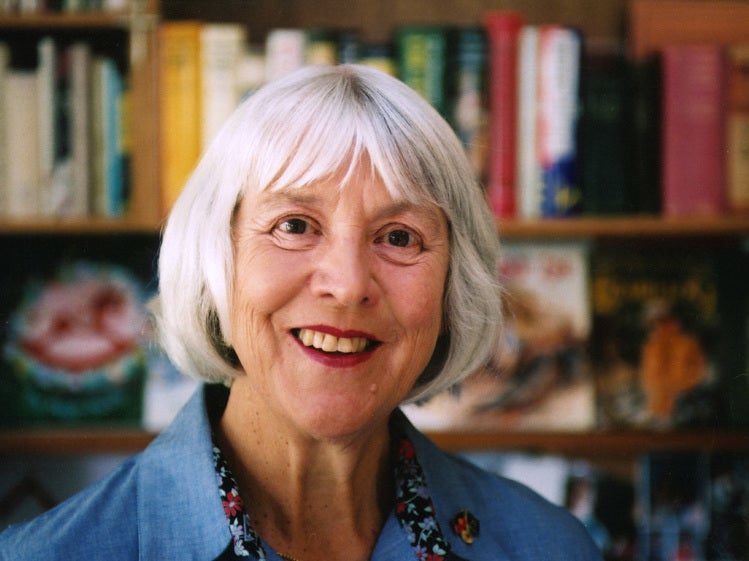Christobel Mattingley: Prolific Australian children’s author
Covering a range of topics as diverse as the worry of starting a new school and a child’s view of life as a refugee, Mattingley’s books were much lauded both for their prose and their compassion

Your support helps us to tell the story
From reproductive rights to climate change to Big Tech, The Independent is on the ground when the story is developing. Whether it's investigating the financials of Elon Musk's pro-Trump PAC or producing our latest documentary, 'The A Word', which shines a light on the American women fighting for reproductive rights, we know how important it is to parse out the facts from the messaging.
At such a critical moment in US history, we need reporters on the ground. Your donation allows us to keep sending journalists to speak to both sides of the story.
The Independent is trusted by Americans across the entire political spectrum. And unlike many other quality news outlets, we choose not to lock Americans out of our reporting and analysis with paywalls. We believe quality journalism should be available to everyone, paid for by those who can afford it.
Your support makes all the difference.When the school magazine refused to publish her poems, budding writer Christobel Mattingley took to her typewriter and produced a magazine of her own. Some 80 years later, Mattingley was one of the most celebrated Australian writers of her generation and a Member of the Order of Australia for her services to literature and social justice.
Mattingley, who has died aged 87, was born in Brighton, a suburb of Adelaide, South Australia. When she was eight years old, her father’s career as an engineer took the family to Sydney.
Already a keen naturalist, Mattingley began a diary describing the wildlife she found in the family’s new garden. By the time she was 10, her observations were being published in the children’s pages of The Sydney Morning Herald and nature magazine Wild Life. Mattingley’s love of nature inspired much of her work.
Later Mattingley’s father took the family to Tasmania, where he built hydroelectric dams. Mattingley’s time in Tasmania was formative. Her interest in conservation intensified as she saw the struggle between the desire for human progress and needs of the natural world. Years later, the struggle would appear in her books. After graduating with a first-class honours degree in German from the University of Tasmania, she took a job assisting refugees displaced from Europe by the Second World War. Their experiences would also inform several of her novels.
In 1951, Mattingley became a librarian, a career she would pursue until the 1970s, when she became a full-time writer. In 1953, she married David Mattingley a teacher, who had been a Lancaster pilot in the war. His experiences would inspire Mattingley’s 2007 novel Battle Order 204. Together the Mattingleys travelled extensively, beginning with a two-year working holiday in the UK. They had three children.
Mattingley’s first book, a picture book called The Picnic Dog, was published in 1970. Several picture books followed, including the extremely popular Rummage, the story of disorganised Mr Portwine, a rummage salesman, who tries to tidy up his life, only to find that his friends and neighbours preferred him the way he was.
As a child in Sydney, Mattingley had found inspiration in the history, language and culture of Australia’s First Peoples. Supported by her children’s writing, in 1978 Mattingley went back to college to read Aboriginal Studies at the South Australian College of Advanced Education. Upon graduating, she edited Survival In Our Own Land: ‘Aboriginal’ experiences in ‘South Australia’ since 1836, which was shortlisted for The Age Book of the Year Awards 1988 and the SA Festival Awards 1990.
This was the first of several books Mattingley would write at the request of the First Peoples of Australia. They included Daniel’s Secret (1997) and Maralinga the Anangu Story (2009), which told the story of the survivors of 10 years of British nuclear testing on the Anangu people’s traditional lands.
Mattingley published more than 50 books during the course of her career, covering a range of topics as diverse as the worry of starting a new school and a child’s view of life as a refugee. She was extensively lauded for her work. Rummage took the Children’s Book of the Year Award in 1982.
In 1994, No Gun For Asmir, Mattingley’s child’s-eye view of life in Sarajevo during the Balkans conflict was highly commended in the Australian Human Rights Awards. More recently, her 2016 novel, Maralinga’s Long Shadow: Yvonne’s Story, won the 2017 Young People’s History Prize at the NSW Premier’s History Awards.
Mattingley was made a Member of the Order of Australia for services to literature and social justice in 1996. A year later, she was awarded the Pheme Tanner Award for services to children’s literature. She held honorary doctorates from the universities of South Australia and Tasmania. And the City of South Perth established the annual Christobel Mattingley Awards for Young Writers in her honour.
Looking back over her career, Mattingley wrote on her website: “To be a writer is to be rich, not necessarily in money – few writers are – but to be rich in sharing and reaching out across the world, touching hearts and minds, making friends, knowing that my books are threads in the fabric of other peoples’ lives.”
On the same page, she was proud to be able announce that in 2005, the collection of poems she’d self-published after being rejected by the school magazine had been professionally published by Triple D Books as Nest Egg: A Clutch of Poems.
Mattingley is survived by her three children: Rosemary, Christopher and Stephen.
Christobel Mattingley, writer, born 26 October 1931, died 1 June 2019
Join our commenting forum
Join thought-provoking conversations, follow other Independent readers and see their replies
Comments